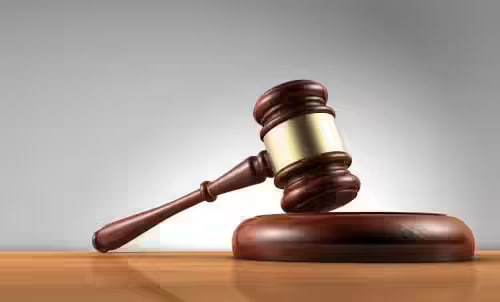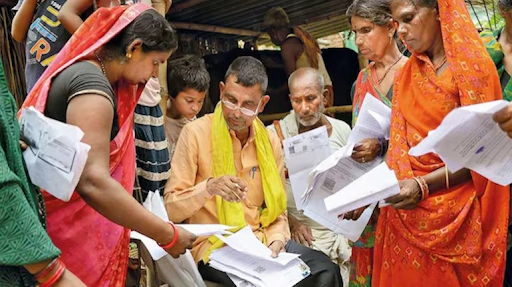



Indian bail system, based on "bail, not jail," faces challenges like disproportionate detention of the poor. To address these issues, the government should review preventive detention laws, strengthen bail accessibility, establish clear guidelines, explore alternative forms of custody, speed up the judicial process, and implement comprehensive bail legislation.

Copyright infringement not intended
Picture Courtesy: Time of India
The Indian bail system is framed around the principle of "bail, not jail" but faces major challenges, including disproportionate detention of the poor, judicial discretion that leans towards denial, and delays that keep undertrials in overcrowded prisons.
It is the temporary release of a person from legal custody, in exchange for a promise to appear in court for future proceedings.
It ensures that personal liberty, guaranteed by Article 21 of the Constitution, is not arbitrarily curtailed before conviction.
Section 2(1)(b) of the Bharatiya Nagarik Suraksha Sanhita, 2023 (BNSS) defines bail as the release of an accused person from custody under specific conditions, upon executing a bond or bail bond.
Bail Mechanisms:
Bond: An accused signs a bond, agreeing to bail terms and assuring court presence.
Bail Bond (Surety): Another person provides a surety, along with a specified payment, assuring the court that the accused will abide by bail conditions.
Criminal law outlines various types of bail under the Code of Criminal Procedure, 1973 (CrPC), and now replaced by the BNSS, 2023.
Bail in Bailable Offences: Section 478 of BNSS establishes a mandatory right to bail for bailable offences.
Bail in Non-Bailable Offences: Section 480 of BNSS governs bail in non-bailable offences, granting discretionary power to courts and police officers.
Anticipatory Bail: Section 482 of BNSS introduces anticipatory bail, allowing a person to seek bail before arrest for a non-bailable offence, except in specific sexual offences.
Default Bail (Statutory Bail): Legal right that entitles an accused person to be released from custody if the investigating agency fails to file a chargesheet within the legally specified period.
Interim Bail: Courts grant it temporarily while regular or anticipatory bail applications are pending.
Bail to Undertrial Prisoners: Section 479 of BNSS mandates the release of an undertrial prisoner on a personal bond if they have been detained for a period extending to one-half of the maximum sentence for the offence.
Bail can be cancelled if the accused:
Misuses their liberty
Interferes with the investigation
Tampers with evidence
Threatens witnesses
Violates the conditions of the bail bond
Commits additional crimes or offenses while on bail
Supreme Court stated the principle "bail is the rule, jail is the exception" in the State of Rajasthan vs Balchand alias Baliya Case (1977).
In Arnesh Kumar vs State of Bihar (2014), Supreme court issued binding directions for mandating preliminary inquiries, recording reasons for arrest, to curb Arbitrary arrests.
In Nikesh Tarachand Shah vs Union of India (2017), the Court struck down Section 45 of the PMLA, finding its restrictive twin conditions for bail discriminatory and arbitrary, violating Articles 14 and 21 of the Constitution.
Sushila Aggarwal vs State (NCT of Delhi) (2018) held that anticipatory bail orders should not be time-bound and can extend until trial conclusion.
Supreme Court, in Policy Strategy for Grant of Bail, In re (2024), directed expedited disposal of bail applications and intervention by Legal Services Authorities to assist undertrials unable to furnish bail, noting that monetary surety should not be a barrier to liberty.
Devinder Kumar Bansal vs State of Punjab (2025) clarified that anticipatory bail is a discretionary power, not an integral part of Article 21.
Prolonged Pre-Trial Detention: According to the India Justice Report (IJR) 2025, about 76% prisoners are undertrials, disproportionately affecting poor and marginalised communities who fail to meet bail conditions due to financial constraints.
Arbitrary Use of Preventive Detention Laws: Laws like the National Security Act (NSA) and PMLA allow for detention without trial, for national security or public safety. These laws are criticised for a lack of judicial oversight.
Delay in the Judicial Process: Slow judicial process is a major contributor to prolonged pre-trial detention. Overburdened courts, lack of infrastructure, and inadequate legal resources extend cases for years.
Lack of Uniformity in Granting Bail: Bail decision lies within the discretion of a judge, thus lack uniformity and consistency in decisions.
Lack of Awareness and Legal Representation: Many accused persons lack knowledge of bail laws or the means to hire adequate legal representation.
Misuse of Anticipatory Bail: Sometimes individuals from elite or political backgrounds misuse the right to anticipatory bail to protect themselves from arrest. (eg. Arnab Goswami late night hearing case 2020)
|
Ministry of Home Affairs launched 'Support to Poor Prisoners' Scheme to offer relief to poor prisoners. The National Crime Records Bureau (NCRB) is the Central Nodal Agency of the scheme.
|
Way Forward
Review and limit the misuse of preventive detention laws. Introduce strict safeguards and mandate regular judicial review to prevent arbitrary detention.
Strengthen bail accessibility. Automatic bail for minor or non-violent offences. Courts should grant bail based on risk assessment rather than financial ability.
Establish clear bail guidelines. Ensure consistency and fairness in judicial discretion, with transparent and objective criteria for bail refusal.
Explore alternative forms of custody. These include house arrest, Open prisons, electronic monitoring, and bail with conditions, to reduce imprisonment.
Speed up the judicial process. Increase courts, introduce technology (AI, blockchain) to enhance management, and reduce case backlogs to minimise pre-trial detention periods.
Implement comprehensive bail legislation, draft a uniform and transparent process for granting or refusing bail, and codify current laws and practices, to align with constitutional principles of liberty, dignity, and presumption of innocence, while balancing victim rights and public safety.
Source: Time of India
|
PRACTICE QUESTION Q. Which of the following cases established the principle "bail is the rule and jail is the exception"? A) Maneka Gandhi v/s Union of India B) A.K. Gopalan v/s State of Madras C) S.R. Bommai v/s Union of India D) State of Rajasthan v/s Balchand Answer: D Explanation: Justice VR Krishna Iyer coined the phrase "bail is the rule, jail is the exception" in the case State of Rajasthan v/s Balchand. |
Bail is linked to the constitutional guarantee of personal liberty under Article 21 of the Constitution, which ensures pre-trial detention remains an exception.
The fundamental principle is that "bail is the rule, jail is the exception," meaning pre-trial detention is an exception, not the norm, upholding the presumption of innocence.
Anticipatory bail allows a person to seek bail before arrest when they apprehend arrest for a non-bailable offense.



© 2026 iasgyan. All right reserved